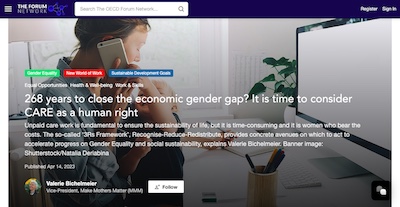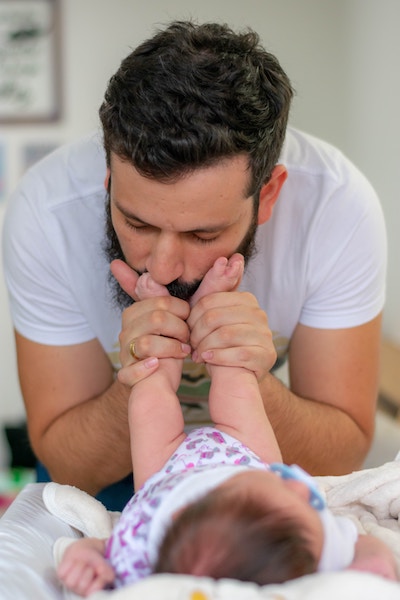Pathways to a transformative recovery centered on Care
04.05.23
UN New York - Ahead of the upcoming 2023 High Level Political Forum (HLPF), MMM's written statement provides 2 concrete policymaking avenues to address the issue of unpaid care work and accelerate progress on Gender Equality, a necessary condition to achieving the SDGs: re-inventing the economy and recognizing Care as a Human Right.

 The following is the full text of our written statement to the 2023 HLPF. An earlier version of this text was published as an article on the OECD Forum under the title: 268 years to close the economic gender gap? It is time to consider CARE as a human right
The following is the full text of our written statement to the 2023 HLPF. An earlier version of this text was published as an article on the OECD Forum under the title: 268 years to close the economic gender gap? It is time to consider CARE as a human right
Learning from the pandemic for a transformative recovery centered on Care
‘The pandemic has shown us who is doing the work that really matters: nurses, teachers, care workers. As we recover, we need to remember this. It is time to end the inequities of unpaid care work and create new economic models that work for everyone’
Antonio Guterres, UN Secretary-General
Town Hall with Young Women from Civil Society Organizations on 31 August 2020
According to a 2019 UNDP Report, accelerating gender equality in all spheres of society will speed up progress towards achieving the 2030 Agenda. But this will not happen as long as the issue of the inequitable distribution of unpaid domestic and care work remains unaddressed.
Globally, women do 3.2 times more unpaid domestic and care work than men, representing 12.5 billion hours of unpaid care work every single day. When valued at minimum wage this would amount to a contribution to the global economy of at least 10.8$ trillion a year, more than three times the size of the global tech industry.
Feminists have long denounced this inequitable distribution of unpaid family care work – or Care gap – as being a major barrier for women to access paid work and participate in public life. But this issue has to date been neglected by policymakers, and although the UN 2030 development agenda has a dedicated target in SDG5 on Gender Equality (Target 5.4), governments have been slow to act.
This is now changing. For all its devastating effects, the Covid-19 pandemic has revealed the critical importance of Care work, essential for the wellbeing of all, as well as the current and future dependence of our communities, society and the economy on women as unpaid and primary caregivers. Covid-19 has also shed light on the magnitude of this work, its inequitable distribution, and the resulting economic and social injustice for women, in particular when they are mothers: with school and childcare closures, 2 million mothers left the labour force in 2020.
But what are we talking about?
The Generation Equality – Action Coalition on Economic Justice and Rights describes Care as ‘both a type of work and the emotional attachment associated with it. Care work includes both direct, personal and relational care activities, as well as indirect care activities that provide support for direct care, such as cooking, cleaning or collecting water, sometimes referred to as ‘domestic work’.
Unpaid care work is fundamental to ensure the sustainability of life, but it is time consuming and it is women who bear the costs: it restricts their ability to generate an income and participate in decision-making, which all too often results in situations of financial dependency, discriminations (e.g. the ‘motherhood penalty’), poverty and exclusion.
What can we do about it?
Feminist economists have proposed the so-called ‘3Rs Framework’, Recognize-Reduce-Redistribute, to guide policymaking.
Recognize.
What is not counted does not count: recognition begins with numbers to make unpaid care work visible. Conducting Time-Use Surveys is a necessary first step to which member States have committed with Target 5.4 of the SDGs. But as of 2018, only 72 States had conducted such surveys at least once. This target must be re-prioritized.
Recognition is also about changing narratives and perceptions:
- Unpaid care work must be framed as ‘work’, indispensable and valuable work, which must be a collective responsibility. Mothers and other unpaid caregivers should not be seen as ‘inactive’ as they contribute to sustaining society and the economy. This also means taking a more holistic view of ‘work’, where both paid and unpaid care work are considered, and their interrelation and interdependence is recognized
- Care work also develops skills, organizational and life skills, which should be valued, especially since these are in demand in the labour market. In fact, raising and educating children, or caring for a dependent relative should be considered a ‘work experience’ and included in CVs
- Policies that support parents and other caregivers must be considered as investments in human capital, not as mere expenses: we know in particular how essential – albeit time consuming and exhausting – nurturing care is for early childhood development, and how much it pays off later in life
Lastly, recognition arises from concrete policy changes as these also shape public views. Paid maternity, paternity, parental and other carers’ leaves, as well as ‘care credits’ in pension calculations are examples of such concrete measures. Disconnecting basic social protection from formal employment and making it universal would be another concrete way to recognize unpaid work.
Reduce.
Unpaid care work often compensates for the lack of basic public infrastructure, including water and sanitation, electricity and other sources of energy, ICT, transportation, and the lack of essential public services like healthcare and care services. Accessible and affordable public infrastructure and services must be a top priority for governments, who must also ensure women’s participation in their development, so that they best serve their needs and reduce time consuming and tedious domestic work. Investing in time and labour-saving technologies like washing machines is also key.
At the same time, ‘Reduce’ should not be about shortening the time we spend caring for people, in particular children.
Redistribute.
 As everyone benefits from it, unpaid care work must be redistributed more fairly, first between men and women, but also across society based on the principle of co-responsibility: every actor of society should take its share, including governments at all levels, communities and the private sector.
As everyone benefits from it, unpaid care work must be redistributed more fairly, first between men and women, but also across society based on the principle of co-responsibility: every actor of society should take its share, including governments at all levels, communities and the private sector.
Challenging gender stereotypes and societal roles, as well as promoting a more equitable sharing of care responsibilities between men and women, not only benefits women, but also men, children and society as a whole. Examples of companies, which have implemented family-friendly policies to support caregivers, show that it pays off in terms of employee productivity, satisfaction, and retention.
This ‘3Rs’ framework is undoubtedly useful as it provides concrete avenues on which policy makers can act.
But basically, we are only patching our current economic and social systems, which are still based on now obsolete assumptions (e.g. the male breadwinner model). Women have tried hard to adapt, often to the detriment of their health, juggling to reconcile care work and responsibilities with their other lives. This logic must be reversed: our systems must be adapted to the realities of care needs and women’s lives.
We at MMM are convinced that we need to take a step back and look at the bigger picture. And this leads us to consider 2 additional ‘Rs’: Re-invent and Rights.
Re-invent.
The economy shapes how we organize societies. But driven by the GDP growth mantra and short-term profits, our current economic system not only completely ignores unpaid care work, but considers this work as an unlimited and free resource. And we can say exactly the same about our natural environment.
In fact, most of the major crises we face today – whether climate change, environmental damage, loss of bio-diversity or increasing inequalities – all have their roots in an economic system that exploits both women and nature.
SDGs will not be achieved without Re-inventing our economy, so that it first serves the wellbeing of all people and the planet in a just and sustainable manner – instead of prospering at their expense. Consensus is growing on the inadequacy of GDP as a measure of well-being and development progress, and the imperative of moving ‘beyond GDP’.
It is now urgent to agree on an alternative model and repurpose our economic system so that we recognize, value, and support the work of caring for each other and for the planet.
Rights.
The international Human Rights framework lays the foundation for a dignified life. It is thus a solid bedrock on which to ground a new economic model.
However, if this framework recognizes both caregivers and care receivers as rights holders, it presents some gaps; in particular, it fails to recognize the dependency of the rights of care receivers on those of caregivers.
Everyone should have the Right to Care and be cared for – in supported, dignified conditions – with all the costs and benefits equitably shared across society.
The time has therefore come to consider Care as a Human Right – Right to Care, Right to be cared for, and Right to self-care.
This would assert the value of Care to society. It would also require governments to ensure protection against discrimination on the grounds of caring responsibilities, and to provide adequate support to every unpaid caregiver – thereby also protecting the rights of any person in need of Care. In particular, a Right to Care has the potential to empower mothers and greatly contribute to ensuring children thrive, triggering a virtuous circle.
Latin America is one step ahead on this path: the Buenos Aires Commitment, which was adopted at the November 2022 session of the Regional Conference on Women in Latin America and the Caribbean organized by the Economic Commission for Latin America and the Caribbean (ECLAC), recognizes Care as a right.
According to the World Economic Forum, at the current pace of progress it will take 268 years to close the economic gender gap – which directly connects to the ‘care gap’. We need a paradigm shift and profound structural changes.
Re-inventing a wellbeing economy centered on ‘Care’ in its broadest meaning, and recognizing Care as a Human Right, provide concrete avenues on which to act to accelerate progress on Gender Equality and social sustainability, and realize the promises of the SDGs.
MMM 2023 HLPF statement for download (with references)
The 2023 High Level Political Forum will take place 10-19 July at the UN headquarters in New York – Theme: Accelerating the recovery from the coronavirus disease (COVID-19) and the full implementation of the 2030 Agenda for Sustainable Development at all levels

The New EU Gender Equality Roadmap : A Call for Inclusion of Mothers
04.03.25
The European Commission’s initiative on a new Gender Equality Roadmap post-2025, marks a significant step forward in addressing gender disparities across the European Union. Make Mothers Matter (MMM
Breaking the Cycle: Gender Equality as a Path to Better Mental Health
18.03.25
The Council of the European Union has taken a decisive step in recognising the vital connection between gender equality and mental health.
Europe Must Listen to Mothers: Our landmark report heads to the European Parliament
28.08.25
On 22 September 2025, the voices of mothers will take centre stage in Brussels. For the first time, Make Mothers Matter (MMM) will present its State of Motherhood in Europe








